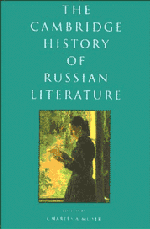Book contents
- Frontmatter
- 1 The literature of old Russia, 988–1730
- 2 The eighteenth century: neoclassicism and the Enlightenment, 1730–90
- 3 The transition to the modern age: sentimentalism and preromanticism, 1790–1820
- 4 The nineteenth century: romanticism, 1820–40
- 5 The nineteenth century: the natural school and its aftermath, 1840–55
- 6 The nineteenth century: the age of realism, 1855–80
- 7 The nineteenth century: between realism and modernism, 1880–95
- 8 Turn of a century: modernism, 1895–1925
- 9 The twentieth century: the era of socialist realism, 1925–53
- 10 The twentieth century: in search of new ways, 1953–80
- 11 Afterword: Russian literature in the 1980s
- Bibliography
8 - Turn of a century: modernism, 1895–1925
Published online by Cambridge University Press: 28 March 2008
- Frontmatter
- 1 The literature of old Russia, 988–1730
- 2 The eighteenth century: neoclassicism and the Enlightenment, 1730–90
- 3 The transition to the modern age: sentimentalism and preromanticism, 1790–1820
- 4 The nineteenth century: romanticism, 1820–40
- 5 The nineteenth century: the natural school and its aftermath, 1840–55
- 6 The nineteenth century: the age of realism, 1855–80
- 7 The nineteenth century: between realism and modernism, 1880–95
- 8 Turn of a century: modernism, 1895–1925
- 9 The twentieth century: the era of socialist realism, 1925–53
- 10 The twentieth century: in search of new ways, 1953–80
- 11 Afterword: Russian literature in the 1980s
- Bibliography
Summary
The period from 1895 to 1925, arguably the most complex in the entire history of Russian literature, may be characterized as the era of modernism in its various manifestations: decadence, symbolism, avant-gardism, futurism, acmeism, formalism, and a number of other doctrines, all of which were formulated by writers acutely conscious of culture as an entity created by human minds. The beginnings of Russian modernism are generally traced to an important critical piece of 1893 by Dmitry Merezhkovsky entitled On the reasons for the decline and on the new currents in contemporary Russian literature, an article which defined the new mood of the Russian intelligentsia, now prepared for a quite different sort of literature than it had welcomed theretofore. When modernism in its various forms did prevail, it held the stage for some time, even past the political cataclysms of the First World War and the October revolution: the literature of the early 1920s which dealt with these events still remained modernist in its approach until about 1925.
The year 1925 functions as a dividing point in literary terms for several reasons, of which two may be noted here. First, in that year the Central Committee of the Communist Party of the Soviet Union passed a resolution enunciating a comprehensive position on questions of literature and art. Although it did not actually exert its control at that stage over such matters, it asserted its right to do so in the future, and eventually did so.
- Type
- Chapter
- Information
- The Cambridge History of Russian Literature , pp. 387 - 457Publisher: Cambridge University PressPrint publication year: 1992
- 2
- Cited by



